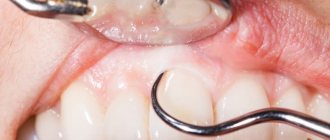Everyone probably knows what a sore throat is. But not everyone is familiar with its varieties. One form of the disease is follicular tonsillitis. The main symptom of follicular tonsillitis is suppurating follicles, which are easy to notice during an examination by an ENT doctor. The disease begins quickly and progresses with pronounced symptoms: severe pain in the throat and joints, very high body temperature. Treatment of this condition should be carried out under the supervision of an ENT doctor. How to cure follicular sore throat? The answer is in our new article.
Throat diseases occupy one of the leading positions in the number of visits by adult patients to an otolaryngologist. And this is not surprising, because most bacteria and viruses enter the body through the mouth. When activated, pathogenic microorganisms trigger an inflammatory process in the throat.
In this case, the palatine tonsils (or, in other words, tonsils), located on the sides of the pharynx, may be susceptible to inflammation.
The inflammatory process in the tonsils has its own medical name - acute tonsillitis. Although the common man is much more familiar with the word “angina.”
There are several types of sore throat in adults, differing in their symptoms and clinical picture. The most common type of acute tonsillitis is follicular tonsillitis.
How does follicular tonsillitis differ from other types of tonsillitis? How is follicular tonsillitis treated in adults? The causes, symptoms and treatment of follicular tonsillitis in adults is the topic of our new article.
Description of the disease
Follicular tonsillitis is a moderately severe variant of tonsillitis that can affect both infants and adolescents 15-18 years old.
Boys and girls are equally susceptible to pathology. According to statistics, this disease occurs in 8-15% of children. The disease is characterized by acute development, but with timely consultation with a doctor, it is accompanied by complete recovery in 90-92% of cases. The danger of the disease lies in possible complications:
- Acute rheumatic fever. When the cardiovascular system is damaged, the valve apparatus of the heart suffers. Acquired defects develop, which, if left untreated, change first the intracardiac and then the systemic hemodynamics of the patient.
- Formation of peritonsillar abscesses. In the area of the palatine tonsils, ulcers of different sizes form, which are a source of infection and can cause pathogenic bacteria to penetrate into the membranes of the brain (with the bloodstream).
- Infectious arthritis. Bacteria from the palatine tonsils penetrate into the joint cavity through the vascular bed. There they create foci of local inflammation, cause pain, and reduce the child’s range of free movements.
- Nephritis. Kidney damage is an uncommon complication (up to 6-7% of cases). It is characterized by the formation of a focus of chronic infection in the kidneys, which cannot always be completely eliminated.
When microorganisms penetrate the membranes of the child’s brain, meningitis develops.
The disease directly threatens the patient's life and requires hospitalization in the intensive care unit. Therefore, each episode of follicular tonsillitis should be under the supervision of a doctor. A child does not always need hospitalization. However, it is important for a specialist to assess the condition and determine further therapeutic tactics.
Sore throat without hyperthermia
There are also cases of atypical course of the disease. For example, at a slightly elevated temperature or even at normal temperature. As a rule, this happens in adults with catarrhal tonsillitis. In addition, people with acutely reduced immunity get sick without a rise in temperature. This applies to those diagnosed with cancer, hepatitis C, HIV, etc. The infection can also occur in older people.
Sore throat can occur at normal temperatures and in pregnant women, since hormonal changes in the body can also affect the activity of the immune system.
In such cases, a sore throat may be mistaken for a simple cold and not treated. However, this can be dangerous, since sore throat can cause serious complications and often becomes chronic.
A sore throat without fever can also be caused by a fungal infection. In this case, there are no other symptoms - pain when swallowing, headache and other discomfort. Symptoms include a cheesy coating on the tonsils, bad breath and dry mucous membranes.
Symptoms of follicular tonsillitis in children
Follicular tonsillitis, like most other forms of tonsillitis, debuts with a sore throat (this picture is observed in 80% of cases). Discomfort occurs acutely - on the first day after exposure to the provoking factor. The intensity of pain varies from mild to severe. This depends on the individual characteristics of the child’s body, the aggressiveness of microorganisms and the activity of the immune system. Associated symptoms of follicular tonsillitis in children:
- Fever with an increase in body temperature to 38-39°C.
- Swallowing disorder. A sore throat can make it difficult for a child to eat or even drink. Infants often refuse to breastfeed and cry constantly.
- An increase in size of the palatine tonsils with the appearance of mucosal hyperemia.
- Foci of gray-white plaque form on the surface of the tonsils. When touched, they are easily removed with a cotton swab.
- Lymphadenitis is an increase in the size of nearby lymph nodes.
- General weakness, moodiness, disturbance of normal sleep.
Follicular tonsillitis is characterized by alternating episodes of severe weakness, which coincide with an increase in temperature, and the patient’s normal state of health. Hospitalization of children with this disease is carried out in case of a sharp deterioration in condition or persistent fever that cannot be treated with antipyretic drugs at home.
Types of sore throat
Sore throat differs in the degree of damage to the tonsils:
- catarrhal - the easiest option, in this case the inflammatory process affects only the mucous membrane, the tonsils are swollen and bright red
- lacunar – damage to the canals of the tonsils (lacuna), the tonsils are covered with a characteristic white coating;
- follicular - follicles are formed in the tonsils, which are filled with pus;
- combined - a severe form of tonsillitis, when both lacunae and follicles are affected on the tonsils.
Causes of follicular tonsillitis in children
The palatine tonsils are the first barrier to various microorganisms that enter the patient’s respiratory tract.
They are accumulations of lymphoid tissue rich in immune cells that protect a person from bacteria and viruses. Follicular tonsillitis is the result of a “breakdown” in the function of the palatine tonsils. This can occur either against the background of massive infection with microorganisms, or with an existing immunodeficiency. In both cases, bacteria and viruses (most often group A streptococci) penetrate the lymphoid tissue and begin to multiply. The tonsils turn from a protective organ into a source of infection, which can penetrate various organs through the bloodstream.
The disease is based on a local inflammatory process. Against the background of vasodilation, the tonsils become red and increase in size. Gray-white films are the result of the vital activity of microorganisms. An increase in their number is an unfavorable sign indicating the progression of the disease.
Factors that create conditions for easier penetration of bacteria and viruses into the palatine tonsils are:
- Hereditary predisposition.
- Hypothermia – local and systemic.
- Congenital or acquired immunodeficiency.
- Exacerbation of chronic diseases of other internal organs (cholecystitis, pancreatitis, pyelonephritis).
- Metabolic disorders (diabetes, obesity).
- Chronic processes in the paranasal sinuses of a child (sinusitis, sinusitis, ethmoiditis), otitis media, multiple carious teeth.
Follicular tonsillitis in children is rarely primary. The disease often occurs against the background of an already suffered catarrhal form of the disease.
Causes
Inflammation of the palatine tonsils is provoked by infections transmitted by airborne droplets. Less commonly, infection occurs through contact and household contact (through shared dishes, towels, bed linen). The most common causative agent of purulent sore throat is hemolytic streptococcus. However, if a person’s immune system works normally, bacteria of this group die immediately after entering the body. The development of pathology is facilitated by weakened immunity and provoking factors.
Indirect causes of purulent sore throat include:
- severe hypothermia;
- chronic diseases of the upper respiratory tract;
- oral infections;
- alcoholism and smoking history;
- stress, overwork, strong emotional tension;
- living in areas with difficult environmental conditions;
- deficiency of vitamins and nutrients;
- mechanical damage to the tonsils (trauma, surgery).
The disease is diagnosed with equal frequency in adults and children.
Diagnosis of follicular tonsillitis in children
Making a diagnosis of “follicular tonsillitis” is not difficult for an ENT doctor.
At the initial consultation, the doctor assesses the general condition, collects an anamnesis of the disease, and analyzes the complaints of the patient and his parents. After this, pharyngoscopy is mandatory. Using a light source and a special mirror, the ENT examines the oropharynx and palatine tonsils. When they increase and the presence of typical gray-white plaques, a diagnosis of follicular tonsillitis is established.
To assess the severity of the disease and identify possible concomitant diseases, a comprehensive examination is carried out:
- General and biochemical blood test. Based on the results of these tests, the doctor determines the severity of the inflammatory process and monitors liver and kidney function.
- Sowing a smear from the palatine tonsils onto a nutrient medium. This method allows you to accurately identify the causative agent of sore throat and select the optimal antibacterial drug.
Polymerase chain reaction (PCR) can also be used to identify the pathogen.
The technique is based on the ability to detect RNA or DNA particles of pathogenic microorganisms. If abnormalities in the functioning of other organs and systems are detected, the child is examined by related specialists (pediatrician, ophthalmologist, gastroenterologist).
Treatment of catarrhal tonsillitis in children
Follicular tonsillitis is one of the forms of tonsillitis that responds well to conservative treatment. With the help of medications, in 90-95% of cases it is possible to achieve the desired result. The main thing is to start taking the right medications on time.
Conservative treatment
The main goal of drug treatment of follicular tonsillitis in children is to “cleanse” the palatine tonsils from pathogenic microorganisms and strengthen the body’s immune defense. For this purpose, the following groups of drugs are used in otolaryngology:
- Antibiotics. Mandatory group of drugs. Broad-spectrum agents are traditionally prescribed early in treatment (before culture results are available). This allows you to effectively destroy bacteria without even identifying the exact pathogen.
- Rinse and irrigate the oropharynx with local antiseptics. Most often this is an aqueous solution of iodine, various sprays with anesthetics that help reduce the severity of pain in a child and improve swallowing.
- Non-steroidal anti-inflammatory drugs (NSAIDs). Prescribed to suppress an excessive inflammatory response and reduce the child’s body temperature.
It is recommended to use vitamin complexes to strengthen the defenses.
Surgery
Surgical interventions for follicular tonsillitis may be indicated when abscesses form in the area of the palatine tonsils. Peritonsillar abscesses are dangerous due to rupture with the penetration of pus into the vessels supplying the brain. Therefore, they are opened, the contents are removed and the wound is drained.
Contraindications for sore throat
Sore throat is a disease that cannot be carried on your feet. Even in cases where it occurs in a mild form. This can trigger the infection to become chronic or severe, and also contributes to complications.
If you feel better, you should not stop taking antibiotics. It is also not recommended to smoke or drink alcohol, as smoke and alcohol can irritate a sore throat. It is necessary to exclude fatty, spicy, sour and solid foods from the diet for the same reason - so as not to irritate the throat.
It is extremely important to completely cure the disease so that it does not become chronic. Otherwise, you will face the fact that the infection will torment you regularly.
Questions
- Which doctor treats follicular tonsillitis in children?
An otolaryngologist is involved in identifying and treating follicular tonsillitis in children. - Is it possible to treat a sore throat on your own?
Independent choice of drugs for follicular tonsillitis in children under 3-4 years of age is extremely undesirable. Due to early age, many medications cannot be used in adequate doses. This leads to incorrect treatment. You can overcome a sore throat at home. However, in all cases, an in-person consultation with an otolaryngologist is required. This will help avoid the development of serious complications. - Does traditional medicine help with follicular sore throat?
Traditional medicine can have a positive effect in the presence of sore throat. However, it must be borne in mind that in case of high body temperature and pronounced signs of intoxication, antibacterial drugs should be prescribed in 100% of cases. It turns out that with follicular tonsillitis you can do without traditional medicine, but you cannot do without antibiotics. Therefore, in most cases, otolaryngologists do not recommend the use of non-traditional approaches due to the risk of losing valuable time. - Are anesthetic sprays harmful to children?
Anesthetic components in antiseptic sprays are contained in minimal doses. They are external anesthetics approved for use in pediatric practice. Therefore, to relieve pain in follicular tonsillitis, such sprays can be used in complex treatment.
Sources
- Clinical recommendations (treatment protocol) for the provision of medical care to children with tonsillitis (acute streptococcal tonsillitis) FSBI NIIDI FMBA RUSSIA, State Budgetary Educational Institution of Higher Professional Education Krasnoyarsk State Medical University named after. prof. V.F. Voino-Yasenetsky, Ministry of Health of the Russian Federation, Municipal Budgetary Institution of the City Children's Clinical Hospital No. 1 (Krasnoyarsk).
- Modern possibilities of antibacterial therapy in children with chronic tonsillitis. / E.P. Karpova, M.P. Bozhatova. // Russian. Medical journal. – 2010. – T. 18, No. 1. – P. 8-10.
- Acute tonsillitis in childhood: diagnosis and treatment. /VC. Tatochenko, M.D. Bakradze, A.S. Darmanyan. // Pharmateka. - 2009. - No. 14. - P. 65-69.









